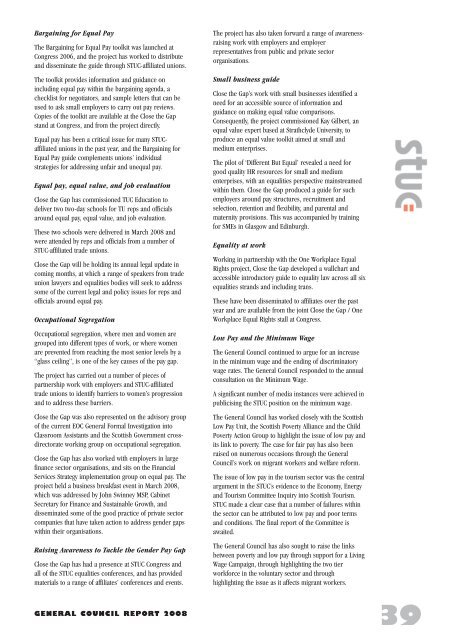You also want an ePaper? Increase the reach of your titles
YUMPU automatically turns print PDFs into web optimized ePapers that Google loves.
Bargaining for Equal Pay<br />
<strong>The</strong> Bargaining for Equal Pay toolkit was launched at<br />
Congress 2006, and the project has worked to distribute<br />
and disseminate the guide through <strong>STUC</strong>-affiliated unions.<br />
<strong>The</strong> toolkit provides information and guidance on<br />
including equal pay within the bargaining agenda, a<br />
checklist for negotiators, and sample letters that can be<br />
used to ask small employers to carry out pay reviews.<br />
Copies of the toolkit are available at the Close the Gap<br />
stand at Congress, and from the project directly.<br />
Equal pay has been a critical issue for many <strong>STUC</strong>affiliated<br />
unions in the past year, and the Bargaining for<br />
Equal Pay guide complements unions’ individual<br />
strategies for addressing unfair and unequal pay.<br />
Equal pay, equal value, and job evaluation<br />
Close the Gap has commissioned TUC Education to<br />
deliver two two-day schools for TU reps and officials<br />
around equal pay, equal value, and job evaluation.<br />
<strong>The</strong>se two schools were delivered in March 2008 and<br />
were attended by reps and officials from a number of<br />
<strong>STUC</strong>-affiliated trade unions.<br />
Close the Gap will be holding its annual legal update in<br />
coming months, at which a range of speakers from trade<br />
union lawyers and equalities bodies will seek to address<br />
some of the current legal and policy issues for reps and<br />
officials around equal pay.<br />
Occupational Segregation<br />
Occupational segregation, where men and women are<br />
grouped into different types of work, or where women<br />
are prevented from reaching the most senior levels by a<br />
“glass ceiling”, is one of the key causes of the pay gap.<br />
<strong>The</strong> project has carried out a number of pieces of<br />
partnership work with employers and <strong>STUC</strong>-affiliated<br />
trade unions to identify barriers to women’s progression<br />
and to address these barriers.<br />
Close the Gap was also represented on the advisory group<br />
of the current EOC <strong>General</strong> Formal Investigation into<br />
Classroom Assistants and the Scottish Government crossdirectorate<br />
working group on occupational segregation.<br />
Close the Gap has also worked with employers in large<br />
finance sector organisations, and sits on the Financial<br />
Services Strategy implementation group on equal pay. <strong>The</strong><br />
project held a business breakfast event in March 2008,<br />
which was addressed by John Swinney MSP, Cabinet<br />
Secretary for Finance and Sustainable Growth, and<br />
disseminated some of the good practice of private sector<br />
companies that have taken action to address gender gaps<br />
within their organisations.<br />
Raising Awareness to Tackle the Gender Pay Gap<br />
Close the Gap has had a presence at <strong>STUC</strong> Congress and<br />
all of the <strong>STUC</strong> equalities conferences, and has provided<br />
materials to a range of affiliates’ conferences and events.<br />
GENERAL COUNCIL REPORT 2008<br />
<strong>The</strong> project has also taken forward a range of awarenessraising<br />
work with employers and employer<br />
representatives from public and private sector<br />
organisations.<br />
Small business guide<br />
Close the Gap’s work with small businesses identified a<br />
need for an accessible source of information and<br />
guidance on making equal value comparisons.<br />
Consequently, the project commissioned Kay Gilbert, an<br />
equal value expert based at Strathclyde University, to<br />
produce an equal value toolkit aimed at small and<br />
medium enterprises.<br />
<strong>The</strong> pilot of ‘Different But Equal’ revealed a need for<br />
good quality HR resources for small and medium<br />
enterprises, with an equalities perspective mainstreamed<br />
within them. Close the Gap produced a guide for such<br />
employers around pay structures, recruitment and<br />
selection, retention and flexibility, and parental and<br />
maternity provisions. This was accompanied by training<br />
for SMEs in Glasgow and Edinburgh.<br />
Equality at work<br />
Working in partnership with the One Workplace Equal<br />
Rights project, Close the Gap developed a wallchart and<br />
accessible introductory guide to equality law across all six<br />
equalities strands and including trans.<br />
<strong>The</strong>se have been disseminated to affiliates over the past<br />
year and are available from the joint Close the Gap / One<br />
Workplace Equal Rights stall at Congress.<br />
Low Pay and the Minimum Wage<br />
<strong>The</strong> <strong>General</strong> <strong>Council</strong> continued to argue for an increase<br />
in the minimum wage and the ending of discriminatory<br />
wage rates. <strong>The</strong> <strong>General</strong> <strong>Council</strong> responded to the annual<br />
consultation on the Minimum Wage.<br />
A significant number of media instances were achieved in<br />
publicising the <strong>STUC</strong> position on the minimum wage.<br />
<strong>The</strong> <strong>General</strong> <strong>Council</strong> has worked closely with the Scottish<br />
Low Pay Unit, the Scottish Poverty Alliance and the Child<br />
Poverty Action Group to highlight the issue of low pay and<br />
its link to poverty. <strong>The</strong> case for fair pay has also been<br />
raised on numerous occasions through the <strong>General</strong><br />
<strong>Council</strong>’s work on migrant workers and welfare reform.<br />
<strong>The</strong> issue of low pay in the tourism sector was the central<br />
argument in the <strong>STUC</strong>’s evidence to the Economy, Energy<br />
and Tourism Committee Inquiry into Scottish Tourism.<br />
<strong>STUC</strong> made a clear case that a number of failures within<br />
the sector can be attributed to low pay and poor terms<br />
and conditions. <strong>The</strong> final report of the Committee is<br />
awaited.<br />
<strong>The</strong> <strong>General</strong> <strong>Council</strong> has also sought to raise the links<br />
between poverty and low pay through support for a Living<br />
Wage Campaign, through highlighting the two tier<br />
workforce in the voluntary sector and through<br />
highlighting the issue as it affects migrant workers.<br />
39


